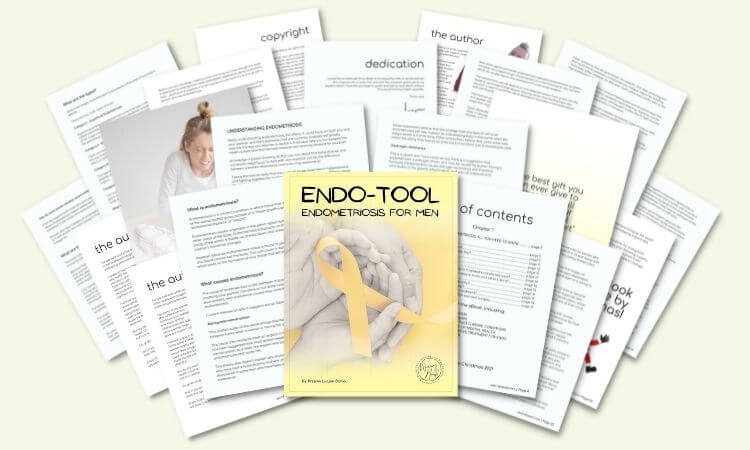Why is endometriosis sex painful? How does it affect male partners?
Why is endometriosis sex painful?
People like having sex because it feels so good! Now, imagine wanting it so bad but your partner tells you “not today hun”… Why is endometriosis sex painful, and how does it affect your man?
Your man begins to question; is endometriosis sex painful, maybe you’re not in the mood today, maybe you don’t want him anymore, or is it him who hurts you?
The truth is, he doesn’t open up about what he feels because you have too much to deal with yourself.
After all, he’s not the one in pain. However, does it mean he’s not affected?
The emotional toll that comes along with loving a woman with endometriosis can be challenging at times, but when it comes to lack of sex, men can struggle.
There is a high rate of divorce amongst couples with endometriosis as opposed to those without this condition.
So, why is endometriosis sex painful?
Not only does penetration causes painful sex, even finishing through masturbation has such painful effect.
Painful sex (dyspareunia) is caused by factors such as stage or invasiveness of endometriosis, additionally, by indirect contributors like your bladder or pelvic floor dysfunction.
Regardless of the endometriosis stage, pelvic floor tenderness and painful bladder syndrome are associated with the severity of pain.
Endometriosis is associated with an increase in nerve bundle density. This causes tenderness and pain during sex. These nerve bundles are large, and by surrounding perineurium are easily identifiable.
It’s important to know that nerve bundle density is just one-factor causing pain.
There are also other physical factors, such as bladder tenderness, and psychological ones, like depression.
By asking why is endometriosis sex painful, you have to realize that it is a very complex subject.
But to understand the complexity of endometriosis in a simple way, I wrote with my wife “Endo-Tool, Endometriosis for Men” e-Book for men, in which I give you the 1st chapter FREE. It contains 20 pages filled with value, including:
- What is endometriosis?
- What are the symptoms?
- What causes endometriosis?
- What does endometriosis look like?
- What are the stages?
- What are the types?
- What is adenomyosis and how is it related to endometriosis?
- Why do some women develop severe endo and others don’t?
- Does endometriosis cause infertility?
- How is endometriosis diagnosed?
- Do types and stages affect the treatment?
- Recurrence of endometriosis after excision surgery.
Get FREE “Endo-Tool”
Endometriosis for Men e-Book

Why is endometriosis sex painful?
How many women come up with excuses such as “honey, I have a headache” when it comes to sex?
I say shame on them!
Why?
Because my wife would give anything to have a healthy sex life without discomfort, let alone a stabbing, excruciating, lingering for days after the pain.
Half of the women with endometriosis experience pain during sex and orgasm.
Deep dyspareunia (painful sex) reduces sexual activity, your self-esteem, sexual satisfaction, and ultimately your quality of life.
Endometriosis negatively affects your sexual response and arousal.
Many couples find difficulty conceiving because pain with intercourse also contributes to sexual dysfunction.
No evidence for the number of endometriosis lesions being the result of increased pain shows that it is their placement.
Location of endometriosis has been shown to be the main factor for pain during sex.
Another factor, however, is the local presence of nerves around endometriosis. There is evidence that these nerve fibers may be causing the pain.
There is an increased sensitivity of these nerves and their density through local neurogenesis.
This density leads to tenderness, and therefore, the symptom of pain.
Studies behind dyspareunia.
The academic study was done by the Center for Pelvic Pain and Endometriosis in Vancouver, Canada.
The women who participated came from the practice of Reproductive Endocrinology and Infertility, where doctors specialize in laparoscopic excision of endometriosis.
Prior to their surgery, women went through a gynecologic assessment in order to find out the severity of their pain.
Doctors rated their pain scale from 0 to 10 and recorded them before women’s surgery.
Gynecologists assessed all the women using endovaginal ultrasound when examining their pelvis.
The ultrasound probe was used to check the tenderness of:
- The uterus – no need to explain.
- Adnexa – the space in your body where are the uterus, ovaries, and fallopian tubes.
- Uterosacral ligament – a part of the thickening beside your cervix and vulva.
- Cul-de-sac – the space between the upper vulva and your bum.
The pelvic examination revealed increased sensitivity before laparoscopy.
At the time of laparoscopic surgery, all visually suspected endometriosis was excised and sent to pathology for histological confirmation.
The study group consisted of women having deep dyspareunia, tenderness, and confirmed endometriosis.
Women that were non-tender on examination and who did not manifest deep dyspareunia were tested to determine whether local nerve density caused their pain.
This study provides evidence that an increase in nerve bundle density is associated with pain and tenderness.
In a study of 28 cases of deep rectovaginal endometriosis (which my wife has), they found
that nerve fibers within endometriosis lesions are more frequent.
So-called “deep-hitting contact of the posterior compartment” becomes painful, which gives you more tenderness during the gynecological examination and deep pain with intercourse.
Local to endometriosis lesions nerves produce tenderness of the posterior compartment and pain, which may include inflammation from endometriosis.
This study has also shown that surgical ablation of endometriosis may not have the same effect on nerve bundles surrounding endometriosis as excision of the entire lesions.
Long-term results show that excision is better than ablation specifically for the outcome of painful sex.

Bladder and endometriosis.
The endometriosis cells from outside the bladder or bowel. Sometimes they grow even deeper within the walls of the bladder or bowel.
These cells will react in the same way as they would in your womb leading to blood becoming trapped in these organs. The trapped blood is what causes the pain as it becomes inflamed. It’s more common for the bowel to be affected than the bladder.
Unfortunately for my wife, she has this rare type of endometriosis.
The pain from bladder endometriosis can make it difficult for you to urinate or even have a bowel movement. My wife struggles every day.
She also goes often at night to the toilet, because if your bladder is affected, then you may experience an overactive bladder, and feel an urgency (and frequency), as well as pain.
Research estimates that only 1% of women with endometriosis will have bladder endometriosis that affects their urinary system, an umbrella condition called urinary tract endometriosis.
Bladder endometriosis can be severely painful and uncomfortable.
Your doctor may suspect that you have bladder endometriosis if you have been already diagnosed with endo if you continually have bladder or urinary tract problems.
Such symptoms include:
- Blood in the urine (hematuria).
- Frequent urination.
- Painful urination (dysuria).
- Bladder pain.
- Urgent urination.
- Pelvic pain.
- Lower back pain.
These symptoms often get worse when you’re menstruating.
Bladder endometriosis is very rare but it can cause you severe discomfort. When it forms only on the surface of your bladder, it’s called “superficial endometriosis”, if it develops inside your bladder, it’s called “deep endometriosis”.
Endometriosis and male partners…
Let’s not forget, a relationship consists of two people, and men are also affected by it.
Additionally, we feel useless.
Men naturally want to fix things. And because I cannot “fix my wife’s health” I had to learn how to cope with this life-changing situation.
Endometriosis significantly negatively impacts men’s emotional well-being, and little is known about this impact.
Male partners of women with endometriosis experience depression, anxiety, powerlessness, and grief. But that’s just the tip of the iceberg!
It affects our sex and intimacy, planning for (and having) children, our working lives, and financial income. It also requires us to take on additional support tasks and roles.
Endometriosis impacts our emotions, and the absence of professional help, or even simple recognition by society, impacts our well-being. The lack of support available to us results in us being marginalized.
Usually, studies discuss the impact of endometriosis on relationships but are largely focused on women, and it is extremely rare to explain how this condition affects male partners.
Doctors need to take a more couple-centered approach towards endometriosis, and they need to include male partners.
Growing research shows the negative impact of endometriosis on the quality of life of women, who report a negative effect on their sexual function, and strain on intimate relationships, which often contributes to relationship breakdown.
But again, there is no mention of men. It’s like we don’t exist at all… and the voices of male partners remain largely absent from the endometriosis literature.
The impact of endometriosis on sex and intimacy for couples is common. Nearly half of couples report sex to be non-existent or rare, definitely reduced in frequency.
Men feel the impact of endometriosis on their sexual relations with partners, and that includes a loss of intimacy, closeness, and affection.
The impact on our sex life is not only related to women’s pain but it’s also related to women experiencing fatigue, having reduced sexual desire because of medication, low mood, the stress of trying to get pregnant, bleeding, and feeling unattractive.
Most of us are aware of the potential pain we can cause during intercourse which makes us hesitant to suggest such intimacy.
Trying to become a father can be a problem, as many couples experience fertility problems, pursue fertility treatment, and in some cases IVF or adoption.
In such situations, men experience feelings of sadness, worry, or shock having difficulties conceiving.
The impact of endometriosis on our working lives is a bit less important than on women’s working lives. but endometriosis affects us in relation to employment.
This condition makes demands on our time which affects our pay, and the lack of money or even a job prevents us to take time out for appointments or when our partner’s surgery.
Lastly, we also experience a lot of worry about our partner’s well-being, and anxiety. Men feel like “a verbal punch bag” because women are often feeling down and depressed.
Summary.
Although men report several negative and challenging ways in which endometriosis affects them, they also identify positive impacts of the condition.
Living alongside endometriosis, we develop our approach to supporting our partners.
It enables men to become more sympathetic and better partners. Men become capable of listening and offering support. Some of us say how their experiences had enabled them and their partner to become closer and have strengthened their relationships.
I hope you found the answer to why is endometriosis sex painful.
Wishing you both all the best!


About Me
Hi, I’m Lucjan! The reason why I decided to create this blog was my beautiful wife, who experienced a lot of pain in life, but also the lack of information about endometriosis and fibromyalgia for men…
